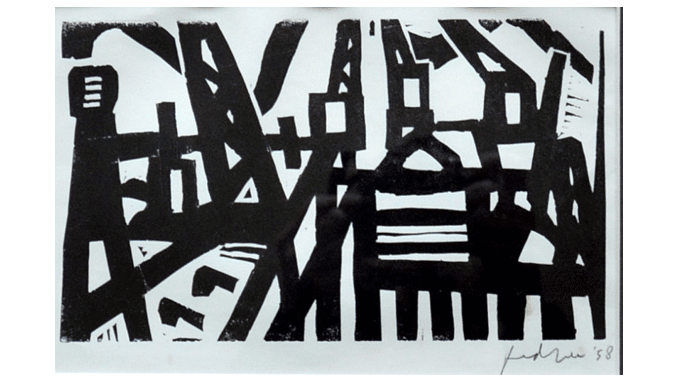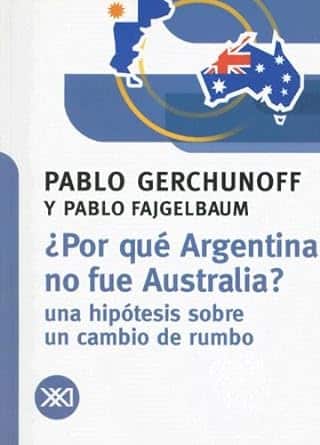Pablo Gerchunoff e Pablo Fajgelbaum:
¿Por qué Argentina no fue Australia?
A Argentina não se tornou uma Austrália basicamente por uma diferença nas instituições, não apenas pela mecânica do protecionismo e da oferta de commodities. Uma análise meramente econômica não dá conta da perda de oportunidades da Argentina no século XX. (PRA)
Argentina e Austrália

Por FERNANDO NOGUEIRA DA COSTA*
A Terra é Redonda, 6/11/2023
Comentário sobre o livro que identifica os fatores que determinaram caminhos diferentes para países que tinham no início características em comum
A Argentina e a Austrália tinham características comuns. Desse modo, permitiam a comparação por historiadores, mas economistas e politicólogos tiveram de identificar os fatores determinantes da bifurcação posterior a 1930.
Um terceiro objeto de comparação – um terceiro país idealizado – é ao qual Pablo Gerchunoff e Pablo Fajgelbaum, no livro ¿Por qué Argentina no fue Australia?, se dedicam à descrição. Buscam extrair do emaranhado enredo da história os elementos presentes (convergentes e divergentes) em ambos os países.
Para fins puramente pedagógicos, apelam à licença para chamar Argentália para este país imaginário. Nessa mistura, ela possui uma variedade de climas, com predominância de temperaturas temperadas.
Na longa história do planeta, é uma nação jovem, pertencente àquele raro grupo conhecido como “regiões de colonização recente”, localizado no hemisfério Sul (Buenos Aires e Sydney estão no paralelo 34) e a grande distância dos centros de poder (Buenos Aires fica a 11.082 quilômetros de Londres e a 8.454 quilômetros de Nova York; Sydney, 16.997 e 15.989, respectivamente). Mas a Austrália está mais próxima da Ásia…
Argentália, desde a sua origem, teve uma pequena população e terras abundantes – em 1896, Argentina e Austrália eram os dois países com menor número de habitantes por quilometro quadrado de terras produtivas. Como consequência desta dotação de fatores de produção, com escassez de trabalhadores, teve salários relativamente elevados em relação à média mundial.
Como produtor de matérias-primas, Argentália viu os dois lados da moeda: durante décadas estabeleceu uma relação privilegiada com a potência dominante, exportando os produtos da terra necessitados pela Inglaterra para facilitar a sua industrialização e importando os insumos, bens de capital e mão de obra da qual necessitava para seu progresso. Contudo, desde a Grande Depressão na nova potência (Estados Unidos), o país sofreu em primeira mão o declínio do comércio de bens primários.
No calor da expansão do mercado interno e da evolução tecnológica dos processos produtivos, surgiram algumas manufaturas dentro de suas fronteiras, principalmente aquelas transformadoras das matérias-primas exportadas. Mas limitada como era pela escassez de mão de obra, Argentália não era um país bem equipado para enfrentar um processo de industrialização sustentado e diversificado.
Enquanto o intercâmbio global continuasse a ser vigoroso e a beneficiar à Argentália, o comércio livre seria conveniente para ambos os países, porque impulsionava o crescimento. Mas o protecionismo passará a ser conveniente para os seus trabalhadores porque, dadas as condições estruturais do país, a proteção econômica aumentará o emprego e os salários reais, e melhorará a distribuição de rendimentos.
O protecionismo melhorará o preço relativo daquilo importado. Considerando, devido à sua dotação original de fatores de produção – abundância de terras e escassez de trabalhadores –, Argentália importar bens relativamente intensivos em mão-de-obra, medidas protecionistas melhorariam o rendimento relativo do trabalho.
As políticas econômicas mais eficazes do ponto de vista do crescimento, por exemplo, comércio livre ou quase livre, determinariam uma distribuição de rendimento favorável os proprietários do fator de produção mais abundante, ou seja, a terra.
Essa lógica específica liga a dotação original de fatores à política econômica, tal como existe uma lógica ligando esta política à dinâmica do crescimento. Este conflito distributivo é característico de Argentália.
Quanto mais agudo for o conflito, mais distributivo será o protecionismo. E quanto mais protecionista for distributivo, mais intensivos em trabalho serão os setores industriais nascidos sob sua proteção, maior será a proporção do emprego total explicada pelas atividades protegidas e maior será a participação dos alimentos e lãs exportadas, componentes da cesta de consumo popular.
Quando o protecionismo distributivo já foi instalado como regime de política econômica, o risco é o stop and go, um termo familiar para argentinos e australianos. Quando se expandem, os setores industriais protegidos exigem importações (insumos e bens de capital) e não fornecem exportações, daí a sua contribuição para as exportações líquidas é baixa e pode até ser negativa.
Se as exportações de matérias-primas crescerem fracamente, haverá desequilíbrios recorrentes no balanço comercial e os governos tentarão corrigir com desvalorizações nominais. Mas, desta forma, os salários reais antes crescentes, devido ao protecionismo distributivo, serão reduzidos.
Enquanto os trabalhadores mantiverem a sua capacidade de resistência, isso resultará em aumento da volatilidade do crescimento e da inflação. Esta só será atenuada se as exportações de matérias-primas forem reavivadas ou os setores industriais começarem a dar uma contribuição positiva para as exportações líquidas.
Na fase de divergência, a Austrália teve um conflito distributivo e um ciclo de stop and go mais moderados diante dos da Argentina. Embora na Argentália o protecionismo seja distributivo, isso não implica as políticas distributivas terem necessariamente origem no protecionismo.
Na Austrália, assim como na Argentina, isto é, na Argentália, se existirem políticas distributivas não emergentes do protecionismo, o protecionismo será necessário para sustentá-las. Enfrenta, portanto, um conflito distributivo e um ciclo de stop and go, derivados da sua própria arquitetura econômica, moldada em grande parte pela natureza e pela geografia – e sobre ela a política tem influência: para o mal, para o bem.
Cada um desses dois países é uma versão de Argentália, mas em algo eles diferem desse mix e em algo eles diferem um do outro.
Historiadores e economistas australianos concentraram-se no declínio da Austrália em relação aos países mais desenvolvidos do planeta. Em 1900, o país tinha o maior rendimento por habitante do mundo. Em 1950, caiu para o terceiro lugar. Em 1970, era o oitavo e na década de 1990 já não estava entre os vinte primeiros.
Exceto em períodos esporádicos, durante o século XX, o produto per capita dos dois países cresceu mais lentamente diante o do painel das nações desenvolvidas. Na Austrália, a relação começa nos 170%, quando os seus poucos habitantes eram “os mais ricos do mundo”, em renda per capita, e termina nos 90%. A Argentina começa com 75%, mas no fim da série o seu produto relativo por habitante é de 35%. Só.
Mesmo depois da grave crise económica do início do século XXI, a Argentina continuou a ter uma economia de rendimento médio. De um total de 179 países, segundo dados do FMI, em 2016, a Argentina ocupava a 61ª posição no ranking de renda per capita.
Embora longe dos padrões de vida da Europa Ocidental ou dos Estados Unidos, o rendimento por habitante argentino de 20.000 dólares (em PPC de 2016) era muito superior ao de quase todos os países africanos, e superior ao dos não-petroleiros do Médio Oriente, do Leste Europeu e as nações do Sul da Ásia.
Em 2021, com US$ 9.997 e em 66º lugar, Argentina já não era o país mais rico da América do Sul como foi durante a maior parte do século XX. Ficou abaixo do Uruguai (49º. US$ 17.029), Chile (53º. US$ 15.399) e Brasil (63º. US$ 11.136). O seu rendimento per capita era consideravelmente inferior ao de Portugal (37º. US$ 23.030) – o país mais pobre da Europa Ocidental – e ao das economias mais ricas da Europa Oriental.
Alerto: não se deve comparar renda per capita sem apresentar a população de cada país. Quaisquer commodities com alta cotação de mercado, dada por fatores exógenos ao país exportador de pequena população, pode lhe propiciar elevada renda per capita – sem ser ela bem distribuída.
Em 2008, dos quase 7,2 bilhões de habitantes do planeta, aproximadamente 5,8 bilhões viviam em países com rendimentos inferiores a US$ 18 mil, e quase um bilhão em países com rendimentos superiores a US$ 34 mil, considerados ricos. Em 2021, os países de renda média do mundo – 30 na faixa de renda per capita entre US$ 11.355 (média mundial) e US$ 27.871 (31º.) – eram poucos com população superior a 10 milhões.
Há cinco grandes grupos principais de commodities: petróleo, mineração, celulose, proteína animal e agrícolas. Em geral, as mais lucrativas, devido à demanda global e à volatilidade de preços, são na ordem: petróleo, minério de ferro, ouro, prata, cobre, café, soja, gás natural, milho. Falta ainda o gasoduto para conectar vaca muerta até o Brasil…
Conectaria essa região com grandes reservas de gás não convencional por 467 km a outro gasoduto já existente por meio de financiamento com o BNDES. Além disso, a Argentina possui 21% das reservas mundiais de lítio (a 3ª. maior do mundo) e é a 4ª. maior produtora mundial do mineral, “o petróleo branco”…
*Fernando Nogueira da Costa é professor titular do Instituto de Economia da Unicamp. Autor, entre outros livros, de Brasil dos bancos (EDUSP). [https://amzn.to/3r9xVNh]
Referência
Pablo Gerchunoff e Pablo Fajgelbaum. ¿Por qué Argentina no fue Australia? México, Siglo XXI Editores, 2019, 108 págs. [https://amzn.to/49m6pgV]

